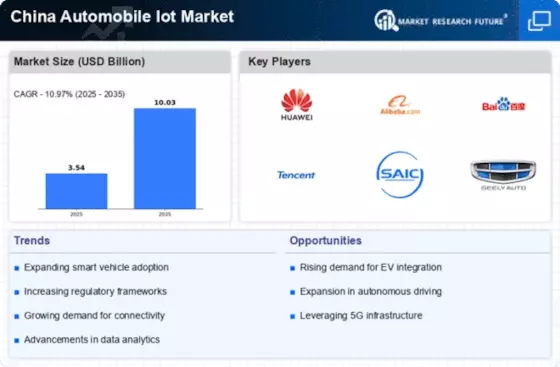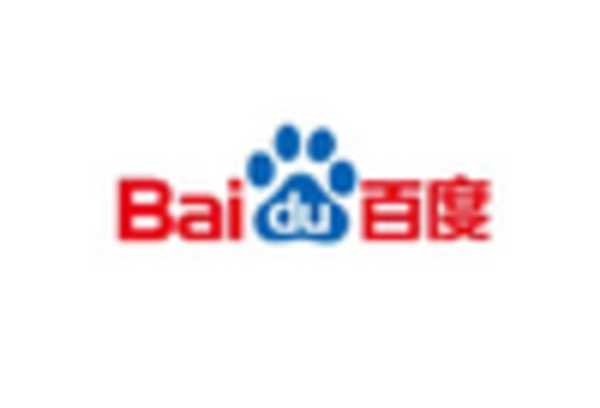Government Support and Regulations
The China Automobile IoT Market benefits from robust government support and favorable regulations aimed at promoting smart transportation solutions. The Chinese government has implemented various policies to encourage the adoption of IoT technologies in vehicles, including subsidies for manufacturers and incentives for consumers. In 2025, the government announced a plan to invest over 100 billion yuan in smart vehicle infrastructure, which is expected to significantly boost the market. This regulatory environment fosters innovation and attracts investments, thereby enhancing the growth potential of the China Automobile IoT Market.
Advancements in Automotive Technology
Technological advancements play a crucial role in shaping the China Automobile IoT Market. Innovations in artificial intelligence, machine learning, and data analytics are enabling the development of sophisticated IoT applications in vehicles. For instance, the integration of AI-driven systems allows for predictive maintenance and enhanced vehicle performance. In 2025, it is projected that the market for automotive AI solutions in China will reach 50 billion yuan, indicating a strong growth trajectory. These advancements not only improve vehicle functionality but also contribute to the overall competitiveness of the China Automobile IoT Market.
Focus on Environmental Sustainability
The growing emphasis on environmental sustainability is influencing the China Automobile IoT Market. As the government and consumers prioritize eco-friendly solutions, automakers are increasingly integrating IoT technologies to enhance fuel efficiency and reduce emissions. The introduction of smart traffic management systems, powered by IoT, is expected to optimize vehicle flow and minimize congestion, contributing to lower carbon footprints. By 2026, it is anticipated that the market for green IoT solutions in the automotive sector will exceed 30 billion yuan, reflecting the industry's commitment to sustainability in the China Automobile IoT Market.
Rising Consumer Demand for Smart Features
There is a notable increase in consumer demand for smart features in vehicles, which is driving the China Automobile IoT Market. As consumers become more tech-savvy, they seek vehicles equipped with advanced connectivity and automation features. According to recent surveys, approximately 70% of Chinese consumers express a preference for vehicles with integrated IoT capabilities, such as real-time navigation and remote diagnostics. This trend is likely to propel manufacturers to invest in IoT technologies, thereby expanding the market and enhancing the overall consumer experience in the China Automobile IoT Market.
Collaboration Between Automakers and Tech Companies
The collaboration between traditional automakers and technology companies is a significant driver of the China Automobile IoT Market. Partnerships are being formed to leverage the expertise of tech firms in IoT solutions, enhancing the capabilities of vehicles. For example, several major Chinese automakers have joined forces with leading tech companies to develop smart vehicle platforms that integrate IoT technologies. This synergy is expected to accelerate innovation and improve the quality of IoT applications in vehicles, thereby fostering growth in the China Automobile IoT Market.
















